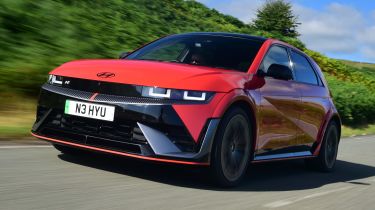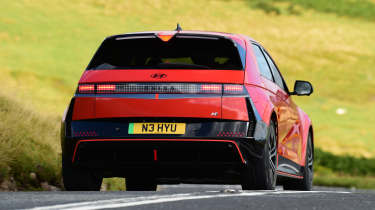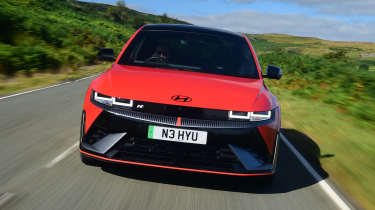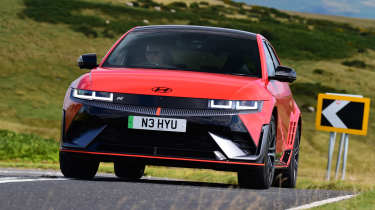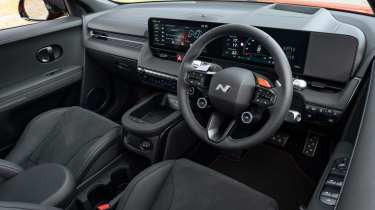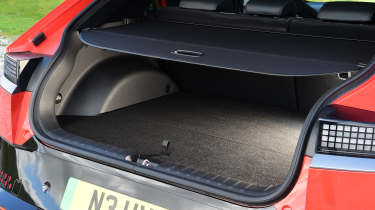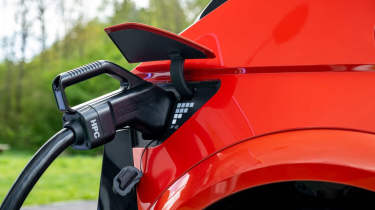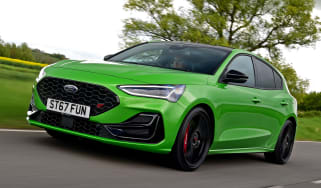Hyundai Ioniq 5 N review - sensationally quick and engaging
“The Hyundai Ioniq 5 N sets the benchmark for fast EVs, but all its tech doesn’t come cheap”
Pros
- Incredible performance
- Engaging simulated manual shifts
- Still practical
Cons
- Sub 300-mile range
- Firm ride
- Heavy
Verdict – is the Hyundai Ioniq 5 N a good car?
Who said you can’t have some fun whilst saving the planet? Clearly not Hyundai’s N performance division, which has spent the last few years fettling the popular Ioniq 5 family EV to create its first zero-emissions performance car. With more power and driving tech than a Tesla Model 3 Performance, Hyundai clearly wanted to make a statement, and the addition of a simulated manual gearbox makes the Ioniq 5 N feel engaging. It also has a practical side, but with a price tag of £65k, it will prove too expensive for many.
Hyundai Ioniq 5 N models, specs and alternatives
One thing that’s for sure is that electric cars can be capable of face-bendingly quick acceleration and power figures. However, it’s also become clear that making a car fun on a B-road or track is much more nuanced – that’s where the Hyundai Ioniq 5 N comes in.
 The 10 best hot hatchbacks to buy in 2025
The 10 best hot hatchbacks to buy in 2025
We’ve been thoroughly impressed by the Hyundai i20 N and i30 N hot hatchbacks, and now the South Korean brand’s performance N division has turned its hand to the electric Ioniq 5. In fact, in early 2024 the brand officially announced that it would no longer make petrol-powered N models, and has gone all-in on electric power, so it’s safe to say it’s confident the Hyundai Ioniq 5 N can offer all the fun buyers are after.
More reviews
To do this, the N division has included some gimmicks and gadgetry to make the experience about more than on-paper performance figures. For starters, the Ioniq 5 N gets augmented engine noises – a technique also used on the burbling Abarth 500e – but the real talking point is Hyundai’s innovative e-Shift system, which simulates gear shifts like those of a conventional car.
While other EVs like the Tesla Model 3 Performance, Polestar 2 BST and BMW i4 have offered big performance already, none have been quite as overt as the Hyundai, with its hardcore approach to sporty driving.
After drinking in its stocky exterior and big rear wing, the first thing you’ll notice is the heavily sculpted bucket seats that hold you in place. Like a few of the surfaces in the 5 N, they’re trimmed in Alcantara for a motorsport feel, and it does help to set the tone for the driving experience.
Alongside this, a sports steering wheel with satellite controls for its various N modes, and a few other tweaks, the cabin isn’t too far removed from the standard car. Some may find that galling for a car costing over £60k – we’d have preferred higher material quality on surfaces such as the shift paddles – but as former Subaru Impreza and Mitsubishi Evo owners once had to understand, most of the cash has been spent elsewhere, on the bits of the car you can’t see.
£65,000 seems like a huge sum to pay for a car like this, but the more you dig into the Ioniq 5 N’s credentials, the less outlandish its price looks. It undercuts both the BMW i4 M50 and hardcore Polestar 2 BST 230 (which both cost over £70k), and offers more dynamic ability than the £60k Tesla Model 3 Performance. Stick with petrol power and the Mercedes-AMG A 45 S costs from £63k, despite having just 415bhp. Still, time will tell whether buyers are ready to shell out so much for a car with this level of badge appeal, no matter how good it is.
| Trim levels | Power options |
|
|
Hyundai Ioniq 5 N alternatives
High-performance EVs
Petrol hot hatchbacks
Range, charging & running costs
It might have well over 600bhp, but if you’re circling the M25 on a wet and windy evening, you’ll probably be more interested in the Ioniq 5 N’s range figure than its top speed. Luckily, despite all the go-faster-bits, it’s not too bad – Hyundai says around 280 miles is realistic in normal use. That is some way behind the 318 miles of an entry-level Tesla Model 3 though, so you are making a sacrifice for all that performance.
Don’t click away yet, because the Ioniq 5 N does have a riposte. Thanks to its clever electrical architecture, it can charge almost as fast as it laps the Nurburgring, going from nearly empty to 80% in just 18 minutes if you find an ultra-rapid charging post. Take a quick break for an energy drink and it will be ready to hit the road (or track) again.
| Model | Battery size | Range |
| Hyundai Ioniq 5 N | 84kWh | 282 miles |
Insurance
The Ioniq 5 N ticks all the boxes that add up to a pricey insurance premium, and sitting in group 49 it's just one rung below the ceiling. Still, quite a lot of performance EVs like the Tesla are in the top group 50, so it should be slightly cheaper to insure than Model 3 Performance. The BMW i4 M5 is slightly cheaper again in group 44, while the Polestar BST Edition 230 is in group 46.
Electric motor, drive & performance
So here it is, the first all-electric model to wear Hyundai’s ‘N’ performance badge, joining a growing crop of hot hatchbacks to hit the market. In fact, with up to 641bhp on tap, can it even be called a hot hatch? “Searing” might be more appropriate. The Hyundai does at least stick with the ethos of a performance hatch that more emphasis should be placed on handling than straight-line speed, and we’re inclined to agree – with electric cars’ democratisation of lofty power figures, it’s fair to say there’s now more that needs to go into the hot-hatch recipe to deliver on the X factor, and Hyundai may have found the right ingredients.
Unlike some past Tesla models, we found the Ioniq 5 N is far more than just a missile at the drag strip. The presence of two electric motors (one for each axle) and all sorts of mechanical and electronic wizardry means that the 5 N can do things a 2.2-tonne family car probably shouldn’t be able to – it changes direction in a way that beggars belief, offering fantastic levels of grip and very little body roll.
One of the Ioniq 5 N’s biggest party pieces, though, is its e-Shift feature, which mimics a conventional car’s gear changes to offer a more engaging driving experience – in fact, these are modelled after the eight-speed semi-automatic gearbox of Hyundai’s own i20 N. It sounds a bit silly in theory, given that an EV doesn’t really need gears, but Hyundai’s implementation of it is very convincing.
Shift with the paddles and the car gives a little jolt, mirroring the sensation of a gear change, while Hyundai’s Sound+ fake combustion engine noise is even pumped into the cabin to make the experience more realistic. There's a slight hesitation in the engine noise, and even artificial pops from the 'exhaust'. This works much better than the Abarth 500e’s augmented engine noise, as the fake revs in that car increase in a linear fashion, whereas the Hyundai Ioniq 5 N’s fake noises drop and rise with every gearshift. In fact, push the Ioniq 5 N’s revs to the redline and power will plateau just as it would in a combustion-engined car – drop a gear and the motors are programmed to mimic the feeling of engine braking.
The beauty of this system is that it’s heavily customisable, too. Don’t want to shift manually? Put it back into auto mode. Want to change the engine sound? You get a choice between three settings: ‘Ignition’ mode, which mimics the realistic sound of an engine, ‘Evolution’ which offers a surreal engine note which sounds like a cross between a combustion engine and electric motor, and ‘Supersonic’ which is best described as sounding like a spaceship. Want to waft along in silence? You can turn off the sounds altogether.
One caveat is that while Hyundai told us the Ioniq 5 N is its most comfortable N model yet, that’s not really saying very much. We’ve driven it in South Korea, Barcelona, and the UK, and even in its gentlest driving mode, we found the 5 N was quite sharp over bumps – a trade-off for how well its suspension setup enables it to handle around a racetrack.
0-62mph and top speed
Switching to electric motors has allowed Hyundai’s N division to unleash serious firepower, now it's no longer hamstrung by the 2.0-litre turbo petrol of the Hyundai i30 N. While that (otherwise excellent) hatch had a mere 276bhp, the dual electric motors of the Ioniq 5 N provide…wait for it…601bhp in normal usage, and 641bhp for brief bursts in its N driving mode. It’s a frankly absurd level of power usually associated with supercars. Driven back-to-back with a Porsche Taycan along British A and B roads, we found the Hyundai had little problem keeping up with the far more expensive car.
The result is that – despite its admittedly hefty weight figure – the 5 N can wind the horizon towards the windscreen at an alarming rate, whenever you feel like it – laws and conditions permitting, of course.
Another benefit of such an embarrassment of riches in the power department is that it has given N engineers options to have fun. For instance, there are settings that replicate the feel of a petrol engine, and even the sensation of lag as an old-school hot hatchback’s turbo would kick in. It might not make the car faster, but it’s just one more way to help it appeal to customers.
| Model | Power | 0-62mph | Top speed |
| Hyundai Ioniq 5 N | 641bhp | 3.4s | 161mph |
Interior & comfort
We’ve come to expect stylish and tech-filled interiors from Hyundai, but as you’ve probably noticed, the prices of its cars have shot up too. While there’s not much wrong with the Ioniq 5 N’s cabin, it feels more closely aligned with the £45,000 price of a regular Ioniq 5 than the lofty £65k the N version commands.
The biggest differences we could spot during our test were Alcantara trim for the steering wheel, sculpted bucket seats and lots of N badges. It feels suitably motorsport themed then, but the BMW i4 still feels more upmarket.
Infotainment and navigation
That’s not to say the N is poorly equipped, because it’s loaded to its roof spoiler with kit, starting with the neat 21-inch alloy wheels it stands on. There’s also crisp LED exterior lighting, heated and cooling front seats, and a head-up display so you won’t have to take your eyes off the road as it zooms towards you. One of the few optional extras is a panoramic roof, costing around £1,200.
Tech fans should also be happy with the twin 12.3-inch screen setup that spans much of the dashboard. We’ve tested this extensively in lots of Hyundai models, and it’s impressively responsive to finger presses, while shortcut buttons make accessing common functions a bit quicker and easier. There’s also a touch-sensitive panel below the media screen for adjusting the climate control, which is a nice touch if your passenger decides they want warm feet as you’re studying the sat-nav.
An N page within the infotainment includes lots of performance settings, including a lap timer and the ability to tweak how much power is sent to the front or rear axles and put the car in its Race Mode. Hyundai has certainly taken a kitchen sink approach, which will no doubt be appreciated by driving enthusiasts, but there are too many settings to fiddle with on the move.
Practicality & boot space
Is it a hatchback or is it an SUV? It’s a debate that’s raged on within Carbuyer’s team of experts, but whatever the Ioniq 5 is, there’s no denying its size. There’s no delicate way of putting this; it looks like a family hatch that’s been blown up in scale by 10 or 20%, and the advantage is masses of interior space.
That’s no different for the Ioniq 5 N, which still has acres of space in the back seats and five doors with generous openings for getting in and out. The rear seat is a straightfoward bench, but trimmed with a grippy Alacantara material, and a flat floor means there's plenty of foot space. ISOFIX child-seat mounting points are positioned in the outer two rear seats. Like the best hot hatches, it means you can ‘race’ on a Sunday and pick up your nan to take her to the shops on the following Monday. Unlike the first regular Ioniq 5's, the N version even gets a standard rear windscreen wiper to boost visibility.
| Size comparison | |||
| Model | Length | Width | Height |
| Hyundai Ioniq 5 N | 4,715mm | 1,940mm | 1,585mm |
| Polestar 2 hatchback | 4,606mm | 1,859mm | 1,473mm |
| BMW i4 | 4,783mm | 1,852mm | 1,448mm |
| Tesla Model 3 | 4,720mm | 1,993mm | 1,441mm |
Boot space
The standard Ioniq 5 has a vast boot measuring well over 500 litres, and aside from a greater risk of breaking all your eggs on the way home from a shop, the 5 N is virtually as practical with just 20 litres less space. It’s still possible to fold down the back seats too, so this remains a car you can buy with your head as well as your heart. The boot floor is rather high, though, so unlike in some EVs the boot space is a bit shallow for tall or bulky objects.
| Boot space comparison | |
| Model | Boot space |
| Hyundai Ioniq 5 N | 480 litres |
| Polestar 2 | 440 litres |
| BMW i4 | 470 litres |
| Tesla Model 3 | 542 litres |
Reliability & safety
Hyundai has become something of a pioneer in electric car technology, so it should provide reassurance that it’s far from being the new kid on the block. In fact, its Ioniq 5 represents its second generation of EV models, following early cars like the Ioniq Electric and Kona Electric that were still based on combustion-engined cars. Hyundai has gained valuable real-world data and knowledge from the countless miles driven by its EV early adopters, and these learnings have culminated in cars like the Ioniq 5 N.
Hyundai itself came 17th out of 32 brands in our 2024 Driver Power satisfaction survey, which sounds a bit mediocre, but places it above quite a few premium German marques. The brand performed best for running costs and value, while it was weakest for driving pleasure – an area the Ioniq 5 N itself has no issues with. A mediocre 22.8% of Hyundai owners reported a fault within the first year.
Safety
Along with its massive brakes and freakish ability to accelerate if you need a burst of speed to get you out of a pinch, the Hyundai is also loaded with active and passive safety features. Its radar sensors can detect cars, pedestrians and cyclists to help prevent collisions around town, even when dealing with junctions.
This helped contribute to a five-star safety rating from Euro NCAP when the standard Ioniq 5 was crash-tested in late 2021, and we expect this score to be carried over to the performance N version.
Which Is Best?
Cheapest
- Name478kW 84 kWh 5dr Auto
- Gearbox typeAuto
- RRP£65,680
Most Economical
- Name478kW 84 kWh 5dr Auto
- Gearbox typeAuto
- RRP£65,680
Fastest
- Name478kW 84 kWh 5dr Auto
- Gearbox typeAuto
- RRP£65,680
